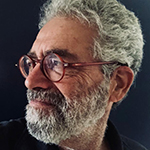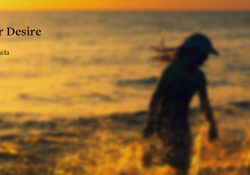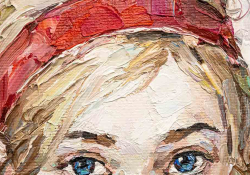The Captive
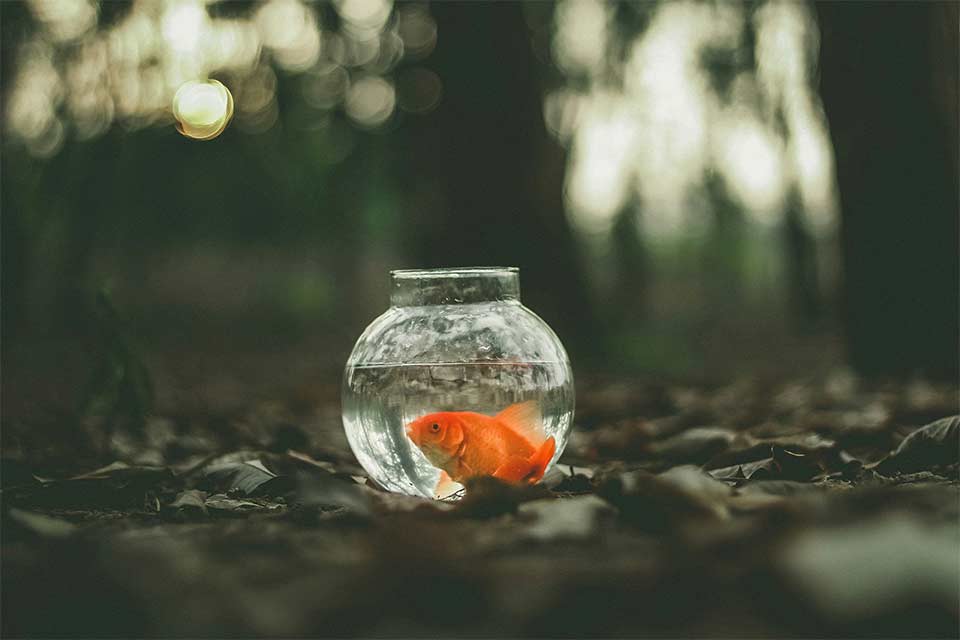
A man shelters from war in Gaza with his ailing fish, his mind turning to Yuri Gagarin, the first man in space.
Do you see this little fish? Look at him. See how he floats in the water, almost motionless, so close to the side of the aquarium?
At first, I kept him in a jar. A large candy jar. I only bought this aquarium a few weeks ago, but I couldn’t decide on a suitable spot for it. I wanted the little fish to feel comfortable. So, I moved the aquarium from one place to another. At first, I put it on the top shelf of the bookcase, by the menorah. But I could see that the fish was not happy. Then I moved it to the kitchen and placed it on a barstool in front of the washing machine. I thought the clothes swirling round in the water would amuse the little fish. But no. I could see that he was still gloomy, that something was not quite right. So I returned the aquarium to the living room, to the bookcase, but this time I placed it on a lower shelf next to the collection of art books.
I also got him a miniature castle and put it in the sand at the bottom of the aquarium, and then I planted seaweed around it.
I did all this just to please the little fish. To make him feel at home. But he still wasn’t happy.
When I placed the aquarium in front of the window facing the open sky, the little fish finally seemed joyful. But only at nighttime.
During the day he hides in a kelp forest, completely out of sight. At nightfall, just after sunset, he emerges from his hiding place and swims into sight, floating by the side of the aquarium facing the window.
See how he hovers there so serenely, almost without any movement, as if fixed to the glass? It looks as if he is gazing at the sky, at the stars. Or perhaps he imagines that he is at the bottom of the sea and that the flickering lights in front of him are bubbles emitted by solitary creatures of the depths, or by other lonely little fish like him.
This little fish came to Tel Aviv from another city, a city not so far from here. A city that, like ours, is a cluster of salt-eroded concrete blocks stacked on the Mediterranean coast. A twin city called Gaza.
In Gaza, this fish lived in a fish tank that stood on a table near the only window in Nasser Akkawi’s apartment.
There in Gaza, at night, the fish would float by the side of the tank and gaze at the world outside. What did he see out there?
There in Gaza, at night, the fish would float by the side of the tank and gaze at the world outside. What did he see out there? Television screens flickering on balconies. Burning cigarettes. Flashes of pocket mirrors reflecting the eyes of girls applying mascara to resemble their soap-opera idols. Beads of sweat glistening on the foreheads of children kicking a soccer ball in the unpaved alley. The blinding whiteness of the mosque’s minaret, stretched out like a neck ready for slaughter, and a chain of green lights surrounding the narrow balcony at the top.
And when darkness dissolved in the sea and daylight hit the roofs of the city, Nasser Akkawi would cover the fish tank with a black cloth and his fish would fall asleep with his eyes open.
There in Gaza, in the Zaytun quarter, the little fish was not completely unknown, as he is here in Tel Aviv. In Zaytun he was quite famous. Almost, one might say, a celebrity. Everyone knew about Mr. Akkawi’s little fish.
“How is your fish, Abu-Khaled?” the heavy women would ask him when they brought him leftovers from yesterday’s dinners in soot-grimed pots.
“Praised be God,” Akkawi would answer, “may He grant us all peace, like he has to my fish.”
“What’s with your fish, Ya-Nasser?” the bearded young men would inquire, the ones who patrolled the neighborhood on motorcycles with assault rifles over their shoulders.
“Thank God,” Akkawi would answer, “may He grant the humility of my fish to everyone.”
“Tell us something about your fish, Mr. Akkawi,” the children would demand as they chased the ball between potholes in the street. They didn’t really want an answer. They were just eager to hear his strange manner of speech. Muffled sounds emerged from his throat as he uttered familiar but strangely distorted words.
For he was deaf. Yes, I forgot to tell you. Nasser Akkawi was deaf. Stone deaf, as they say.
He answered the children in a voice that sounded as if it came out of a bottle: “Boys, I wish you a blessed silence like the silence granted to my fish and to me by the grace of God.”
But the children knew for sure that God, at least the God Mr. Akkawi mentioned every time he answered them, had nothing to do with the mosque in the center of their neighborhood, or with taking off your shoes, or with placing your forehead on prayer rugs. Because Nasser Akkawi was not like everyone else. That much was obvious. Akkawi was so old and so deaf and so, so lonely. Probably he was also mad.
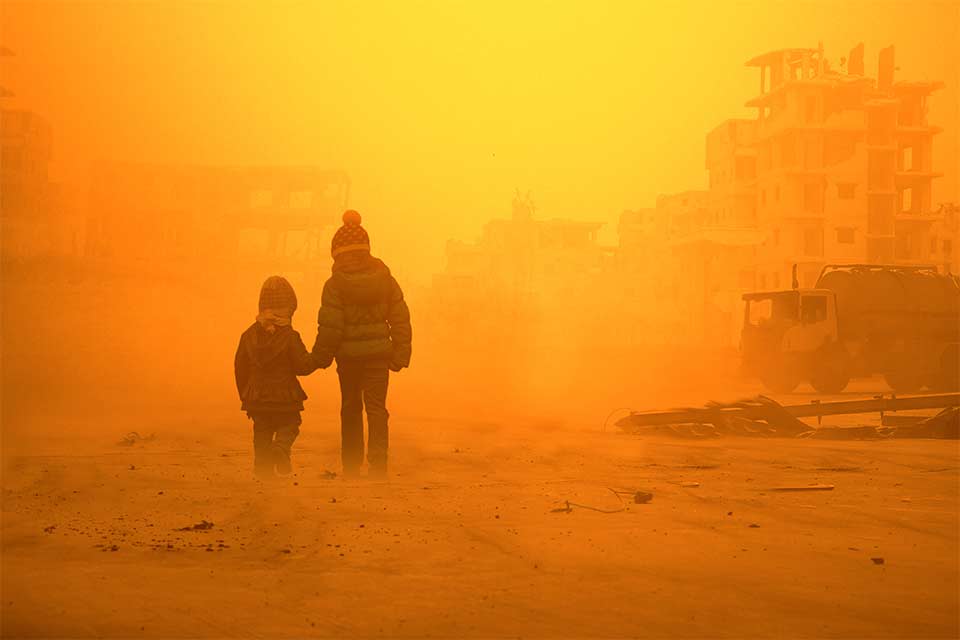
What sane and decent person would keep a fish in a tank in Zaytun?
What sane and decent person would keep a fish in a tank in Zaytun? Honest people keep a hen that lays an egg every day or two. Or they keep a sheep that could be slaughtered for the holiday. Or a donkey that could pull a cart or carry a mountain of junk on its back, one that could be led at the head of a protest with its ears lopped off and the enemy’s flag painted on its belly.
But a fish? And one so small, plain, and faded? A fish lacking any charm or beauty, such that it barely counted as decoration?
Indeed, the general opinion in Zaytun was that old Akkawi had gone soft in the head since his wife died. But there were also those who could appreciate his blissful partnership with the fish. They said, Akkawi found his match. They said, What luck that these two lonely creatures cut off from the world by their deafness should have each other for company. And it’s quite likely that these gossips were right.
Surely, Akkawi would be the first to agree. As an experienced lip reader, Akkawi had no doubt that the subtle movements of the fish’s mouth spoke to him: “papa papa papa.” No hen in the world could say that. No sheep. And certainly no donkey, because who takes a donkey seriously?
But let me continue with my story. Let’s go back to Nasser Akkawi’s apartment. Let’s return to the previous winter.
To that miniwar that our side called Operation Cast Lead.
The locked iron doors and the barred windows reminded Akkawi of the curfews. Gaza has known countless periods of enforced standstill. But in the days when his ears still functioned, Akkawi could prepare, or at least join the communal panic. This time, when he saw the young men on the motorbikes buzzing around screaming into megaphones until their necks swelled, he couldn’t hear whether they were reciting holy verses or issuing warnings. Warnings about another Israeli attack, for example.
Had he watched television, he would have understood without much difficulty what was going on from the images onscreen. They were all too familiar: feverish speakers surrounded by cheering crowds, green flags waving at a march, images of Al-Aqsa’s golden dome with the verses of the shahada running across the screen. Yes, the battle cries had not changed since the previous bloody conflict. But as always in winter, the transmissions were disrupted, at least on Nasser Akkawi’s old TV. As a matter of fact, he had no use for the box at all, which had long since given way on the large table to his fish tank.
That night his neighbor Ibtisam came to see him. She brought a pot of stew.
“The Israelis are about to enter Gaza,” Akkawi read her lips, “so we are leaving for Khan Yunis tonight.” She placed a key in his palm. “You can enter our flat, Abu Khaled, and take anything you need. There is some food in the kitchen.”
Of course, Nasser Akkawi could not hear the artillery barrages, the roar of the planes, the explosions of the rockets, or the noise of the helicopters that hovered over the city. But from his open window, he could see flowers of fire burst open and blaze across the horizon above the rooftops. He closed the shutters. His fish would have to forgive him for the blatant disregard of his nocturnal habits, Akkawi thought. Anyway, the night’s canopy of twinkling stars was completely ruined by the deadly fireworks show.
And so, when the war’s spectacle was hidden from his eyes too, Akkawi sheltered in his hermetic capsule of deafness. Yet the sounds of war were well preserved in his memory, as his hearing had been perfect in ’56, ’67, and even in later years. And Akkawi could not help but imagine the tremendous noise that shook the walls and vibrated within his bones.
In the street below, a tank crushed its way through parked cars like a blind monster. A group of soldiers followed. They ran, clung to walls for cover, and occasionally stopped to shoot at an unseen target. Warplanes, whose wings almost touched the black-white-green-and-red flag hoisted on the school building, fired murderous rockets. Helicopters circled frantically over collapsed roofs. Ambulances raced through the rubble. A whirlwind of leaflets fell from the sky, swirled, hovered over the street, and disappeared.
We are all mortal, Akkawi thought. The end of every living being comes sooner or later, and the last breath cannot be postponed forever. He didn’t worry about his meager possessions, and of course he didn’t have to fear for the safety of loved ones. His wife rested in peace beneath her humble tombstone while her soul dwelled in heaven, just as she had always wished. Their four sons had left Gaza several years ago before the situation had deteriorated. They spread across the globe, settled, and each flourished in his new home.
Nasser Akkawi only worried about his fish.
The water in the fish tank sloshed with each explosion that shook the tiled floor.
Pieces of plaster fell from the ceiling into the tank’s waves. Soon, the water lost its clarity.
On the third day, through the shattered windowpane and the broken shutters, Akkawi peered across to the opposite side of his street. The dusty interiors of bombed-out homes told of the hasty departure of their inhabitants. The debris was shrouded in smoke.
Akkawi affixed an old blanket to the window frame.
As much as his hunger tormented him, his thirst was unbearable. The previous evening all the taps had gone dry, and Akkawi—to his great shame—found himself sipping murky water drawn from the fish tank.
The little fish was also exhausted. His fins barely moved, but in contrast, his gills worked frantically as his mouth pumped out the dirty water in rapid gulps. Now, his soft papa-papa-papa had turned into a series of one-syllable silent cries for help. In his struggle for oxygen, the little fish approached the water’s surface.
Akkawi moved the fish tank and placed it on the stool by his bed. He curled up in the sheets and closed his eyes.
He imagined he was hovering in a black void. This was not a new experience. In recent years, since the death of his wife, Amal, he spent more and more time on these excursions into an inner abyss of absolute silence and endless darkness.
But this time, while he floated in the depths, an image appeared in Nasser Akkawi’s dreaming brain. The image was of a man in an orange space suit whose smiling face inside his helmet bore a distinct resemblance to cosmonaut Yuri Gagarin. Yes, it was him, Gagarin, the first man in space.
Gagarin had orbited Earth alone in a small capsule, and when he landed, he told reporters: “I didn’t see any God up there.” His heretical words were published in all the papers. But he who dares to navigate the abyss alone should be forgiven for questioning the boundaries of divine control. Thus, Gagarin was crowned the hero of humanity. At least for a while. And when he died, the whole world cried for him.
They mourned him in Gaza, too.
That was in 1968, when Akkawi was thirty-four years old, exactly the same age as Gagarin.
Back then Akkawi stood upright and strong, and his ears could pick out every sound, including the calls of the muezzin, which in those days were not yet recorded and broadcast over loudspeakers. Whether there was a God up there or not—as Gagarin stated—life was sweet then. Akkawi remembered sunny, high-ceilinged rooms full of citrus scents carried by the sea breeze, rooms in which laughing children—his sons—chased one another in endless games of tag. A young woman—Amal, his wife—was there, too, in that bright memory spacecraft, and Akkawi could clearly hear the tune she was humming while checking her pupils’ homework.
Yes, life had definitely been sweet, regardless of the newly imposed Israeli military occupation and despite the bitterness that had begun to take over the soul of the city.
The photo of Yuri Gagarin in an orange space suit hung in the café, right next to a portrait of President Abdel Nasser, the great leader of the Arab nation. But as you may recall, not long after Gagarin died, the revered president also passed away—due to a broken heart, no doubt. A black ribbon appeared, pinned to his gold-framed picture as a sign of grief.
But that portrait of the glorious leader, Akkawi’s namesake, soon gathered dust and was removed from the café’s wall. Gagarin, however, is still there. That is, if the café still stands. Political figures, no matter how great they are, cannot compare to men who travel alone up and away into the infinite void.
“If I ever wake up from this dream,” Akkawi said to himself in his dream, “I will name my fish Yuri Gagarin.”
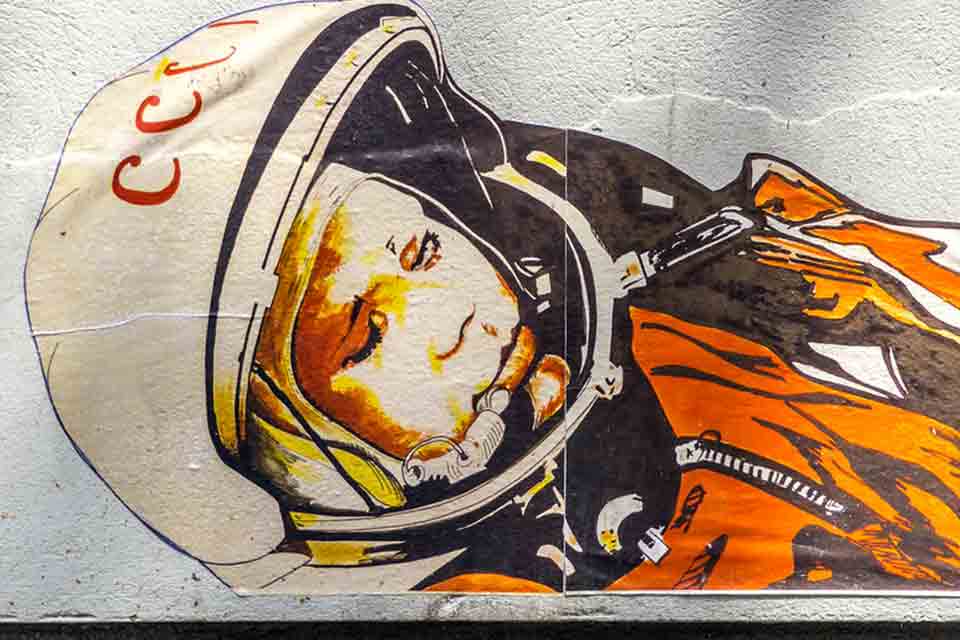
“If I ever wake up from this dream,” Akkawi said to himself in his dream, “I will name my fish Yuri Gagarin.”
On the fifth day, a trio of soldiers kicked open Akkawi’s front door.
One of them tripped and cracked a mirror. Another stumbled on a wicker stool. The third, a tall guy, banged his head against the cupboard and uttered a curse. They certainly must have made a lot of noise, those three. Then the tall one meticulously scanned the apartment with a bright flashlight until the white beam revealed old Nasser Akkawi curled up in his bed, fast asleep. Of course, he had heard nothing.
Was he conscious at all? The tall one leaned over Akkawi and shook his shoulder. Akkawi woke up startled and blinked into the blinding light. Only if he turned his head could he manage to see his guests out of the corner of his eye. Their faces were shadowed by the edges of their steel helmets. They wore heavy military vests laden with combat gear. A strong smell of sweat wafted from them.
The tall soldier spoke to Akkawi. He might have asked something, but Akkawi couldn’t read his lips. The soldiers assumed that the old man didn’t understand their language. One of them remembered a few words of Arabic he learned in high school, but Akkawi couldn’t decipher this gibberish either. The soldiers switched to English. Only minutes later, when the whistle of a shell made them drop to the ground, did they realize the man didn’t respond to sounds, and they finally concluded that he was deaf.
The tall soldier aimed the flashlight beam at the fish tank where the little fish floated on the surface of the water and its pale body fluttered and twisted. The tall soldier spoke to Akkawi with great emotion. He moved his hands excitedly and grimaced. It seemed that by performing an awkward mime act he was desperately trying to raise a very important matter. Did he just want to tell Akkawi that the little fish was suffocating in the polluted water, and that his death was imminent? Akkawi already knew that. He knew his little fish wouldn’t survive much longer.
Finally, the tall soldier took out a notebook and a black marker from one of his many pockets and wrote down in Hebrew and English: “This is an emergency! Your fish is dying!” But of course, Akkawi was unable to understand these words. Still, he took the notebook and the marker from the tall soldier’s hands and with great effort managed to write down crooked Latin letters that he barely knew. He wrote: “yuri gagarin.”
“Yuri Gagarin?” asked the soldier, and Akkawi, who now easily deciphered the question on the soldier’s lips, replied with a vigorous nod.
“Yuri Gagarin,” he said in his muffled, bottled voice.
Now it was the soldiers’ turn to be confused. The famous name did not sound familiar to them. Well, I don’t blame them. History grows and thickens, and old heroes disappear under the litter of new ones, and Yuri Gagarin had left the earth for good a quarter of a century before any of them were born. That is, a long time ago.
History grows and thickens, and old heroes disappear under the litter of new ones.
The soldiers again talked to each other excitedly and pointed toward the fish tank.
“The fish must be saved,” the tall soldier wrote in the notebook. Again, Akkawi did not understand.
The tall soldier hesitated no more. He pulled his canteen from his belt, opened it, put his hand into the fish tank, and caught the flailing fish between two fingers.
Only then did the old man realize what was about to happen.
“Laaaaaa!” Akkawi shouted. He jumped up and grabbed at the tall soldier’s hand. But the other two soldiers were faster. They pushed him away and he fell to the floor, rolling in dust and shards of plaster.
The tall soldier gently dropped the little fish into his canteen. Then he knelt down and directed the flashlight beam into the water to show Akkawi how the fish was recuperating. “Do you see?” he asked. “Do you see?” He scribbled a crude cartoon of a smiling fish in his notebook, turned the drawing to the old man heaped on the floor, and said: “I will take the fish with me now but return it to you as soon as the war is over and there’s peace.”
Then the soldiers spoke into their radio. They had been ordered to move on. Before their hasty departure, they placed on the table, next to the fish tank, three packets of salty snacks, three bars of chocolate, and three packs of chewing gum.
A week passed, then another. The Israelis left. Yet another military operation had ended. The people of Gaza dressed their wounds and began to rebuild. Spring came, then summer. But the tall soldier never came back to Zaytun to return the fish to Nasser Akkawi.
“How’s your fish, Abu Khaled?” asked the heavy women as they bent over their steaming pots.
“Praise be God,” Akkawi answered in his muffled speech. “Now that he is in Tel Aviv, he is well taken care of.” He glanced at the empty fish tank that had a green layer of dry algae crusted on its sides. “Jews love animals,” he added with a faint smile, “everybody knows that.”
I’m sure old Nasser Akkawi still has the notebook I left there for him, the one with my drawing of the smiling fish. His souvenir from the war.
And as soon as I got home and took off my uniform, I googled “Gagarin.”
Look, there he is, there, in that picture hanging over my desk, wearing a cosmonaut suit with the letters C.C.C.P. emblazoned across his white helmet.
Perhaps now you can understand why the window here is always wide open to face the starry sky that flickers distant greetings to my little captive, whose name may be Yuri Gagarin.
Tel Aviv
Translation from the Hebrew
Author’s note: This story takes place during the Israeli military operation of winter 2008 and does not reflect current events in the region.

